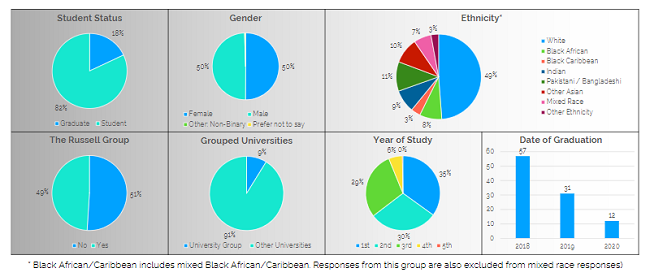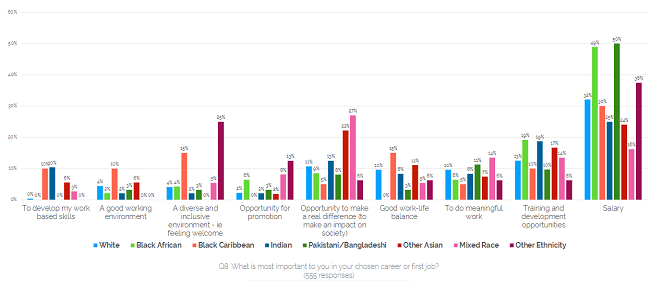New research shows how important it is to understand the perceptions of work among different ethnic minorities, says Katie Purser, recruitment director at Frontline.
Frontline helps to ensure that all children in England have a safe and stable home and that their life chances are not limited by social or family circumstance.
This is achieved by developing excellent social work practice and leadership through our training programmes and by building a movement of leaders in social work and broader society as part of our alumni network.
We prioritise recruiting a diverse cohort to ensure that the social work workforce is a better reflection of the communities it serves and that we bring a wider diversity of perspectives into the profession.
Last year 20% of 450 Frontline participants were from Black, Asian and minority ethnic groups, but we want to do better than this.
According to 2011 census, 40.2% London residents identified with either the Asian, Black, Mixed or Other ethnic group, and we want ensure our cohort is representative of these communities.
Research among students and graduates from different ethnic minorities
Curious to understand how we could be more successful recruiting a more diverse range of participants, we commissioned Jayne Cullen (a freelance researcher) via Hype Collective to explore attitudes towards Frontline amongst students and recent graduates.
The research involved surveying over 550 students and a series of voxpop interviews with individuals from different ethnic groups. For the latter, the students videoed their responses to a set of questions in their own time without the influence of others.
This was a great way to get qualitative research and to test a series of working hypotheses that it had revealed about why specific audiences do not engage with our brand.
The research revealed interesting insights and stories with highlights shared below. To note, around 50% of the survey responses were white so be aware of the smaller sample sizes of non-white ethnic groups (about 7% per group) as you read the data and narrative.

What is most important for a chosen career?
When asked what is most important for their chosen career, the survey told us salary is twice as important for Pakistani and Bangladeshi students than Indian students.
Salary is more important as the determining factor for Black African students whereas Black Caribbean students prioritise good and diverse working environments and good work-life balance over salary.

In our sample, Black African and Caribbean audiences collectively see training and development as a key driver, but this was less so for mixed race students who prioritise the opportunity to make a real difference in society.
We also found that when looking at public sector careers, Black Caribbean audiences find social work the most appealing compared to white and other Asian students who find it the least appealing career choice. However, 35% Black Caribbean students don’t see themselves as having the right degree and 34% Black African students think you need to have studied at a Russell Group university.
The value of insights from different ethnic minorities
This research has helped us to personalise our marketing and recruitment approaches to different minority ethnic groups.
For example, at institutions with higher numbers of Black African and Black Caribbean students, we’re keen to engage with careers advisory services who can help us improve the messages about the Frontline programme; busting the myths about the degree and university backgrounds, helping educate students about social work training and reassuring students about skill requirements.
We’ve also developed a new early engagement campaign This is the Work.
Over the course of three years (we are very aware that this work takes time and there is no quick fix) the campaign has been designed to challenge stereotypes and negative perceptions of social work, raise the status of the profession and actively target and inspire more people to consider social work as a career choice.
Next steps include further developing our recruitment diversity and inclusion strategy to build the talent pipeline that will represent all of our diverse audiences.
What does this mean for employers and universities?
As an employer, you can talk to your colleagues of Black, Asian and minority ethnic backgrounds to help create marketing messages, but how often do you consider the wider talent pool of people from different groups that don’t apply to your company? What are the barriers and myths they may hold about you?
The type of research we’ve done can help develop different audience personas to increase marketing efficiency and effectiveness.
For university employability teams, we encourage you to understand the attitudes of different Black, Asian and ethnic minority groups and continue to personalise your support.
A few final words…
Frontline is an organisation committed to anti-racism. We proactively tackle systems and structures that perpetuate and embed racism in our society. You can read more about our diversity and inclusion approaches here.
Anti-racism doesn’t always feel like an easy topic but, as employers strive to recruit individuals from Black, Asian and minority ethnic backgrounds, we urge you to focus on creating a workplace that is truly welcoming for all.
We believe diversity makes for a stronger team and we know that prioritising investment in recruitment of Black, Asian and minority ethnic groups will make a lasting positive impact on the lives of children and families.
We encourage you to reflect and be curious about the differences between ethnic groups and to not make holistic assumptions about groups of audiences and why they do or don’t engage.
If you missed Frontline talking about their research at ISE’s ISE Careers Advisors and Employer Engagement Conference, you can catch up here


0 Comments